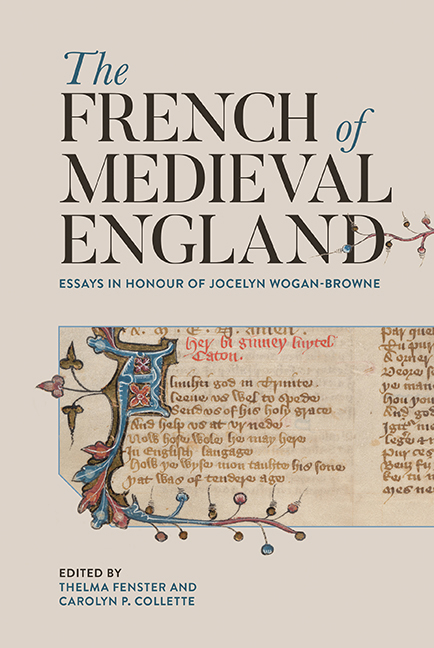Book contents
- Frontmatter
- Contents
- List of Illustrations
- List of Contributors
- List of Abbreviations
- Foreword: ‘The Light I Never Left Behind’: Jocelyn Wogan-Browne
- Introduction: Recognizing the French of Medieval England
- 1 The Gloss to Philippe de Thaon's Comput and the French of England's Beginnings
- 2 The Scandals of Medieval Translation: Thinking Difference in Francophone Texts and Manuscripts
- 3 Contrafacture and Translation: The Prisoner's Lament
- 4 Complaining about the King in French in Thomas Wright's Political Songs of England
- 5 The Chanson d’Aspremont in Bodmer 11 and Plantagenet Propaganda
- 6 The Use of Anglo-Norman in Day-to-Day Communication during the Anglo-Scottish Wars (1295–1314)
- 7 Middle English Borrowing from French: Nouns and Verbs of Interpersonal Cognition in the Early South English Legendary
- 8 William Langland Reads Robert Grosseteste
- 9 Disability Networks in the Campsey Manuscript
- 10 English Women and Their French Books: Teaching about the Jews in Medieval England
- 11 French Residents in England at the Start of the Hundred Years War: Learning English, Speaking English and Becoming English in 1346
- 12 French Immigrants and the French Language in Late-Medieval England
- 13 Fashioning a Useable Linguistic Past: The French of Medieval England and the Invention of a National Vernacular in Early Modern France
- 14 Admiring Ambivalence: on Paul Meyer's Anglo-Norman Scholarship
- 15 Twenty-First Century Gower: The Theology of Marriage in John Gower's Traitié and the Turn toward French
- 16 Royaumes sans frontières: The Place of England in the Long Twelfth Century
- Afterword
- Bibliography
- Index
- Publications of Jocelyn Wogan-Browne
- Tabula Gratulatoria
11 - French Residents in England at the Start of the Hundred Years War: Learning English, Speaking English and Becoming English in 1346
Published online by Cambridge University Press: 12 August 2020
- Frontmatter
- Contents
- List of Illustrations
- List of Contributors
- List of Abbreviations
- Foreword: ‘The Light I Never Left Behind’: Jocelyn Wogan-Browne
- Introduction: Recognizing the French of Medieval England
- 1 The Gloss to Philippe de Thaon's Comput and the French of England's Beginnings
- 2 The Scandals of Medieval Translation: Thinking Difference in Francophone Texts and Manuscripts
- 3 Contrafacture and Translation: The Prisoner's Lament
- 4 Complaining about the King in French in Thomas Wright's Political Songs of England
- 5 The Chanson d’Aspremont in Bodmer 11 and Plantagenet Propaganda
- 6 The Use of Anglo-Norman in Day-to-Day Communication during the Anglo-Scottish Wars (1295–1314)
- 7 Middle English Borrowing from French: Nouns and Verbs of Interpersonal Cognition in the Early South English Legendary
- 8 William Langland Reads Robert Grosseteste
- 9 Disability Networks in the Campsey Manuscript
- 10 English Women and Their French Books: Teaching about the Jews in Medieval England
- 11 French Residents in England at the Start of the Hundred Years War: Learning English, Speaking English and Becoming English in 1346
- 12 French Immigrants and the French Language in Late-Medieval England
- 13 Fashioning a Useable Linguistic Past: The French of Medieval England and the Invention of a National Vernacular in Early Modern France
- 14 Admiring Ambivalence: on Paul Meyer's Anglo-Norman Scholarship
- 15 Twenty-First Century Gower: The Theology of Marriage in John Gower's Traitié and the Turn toward French
- 16 Royaumes sans frontières: The Place of England in the Long Twelfth Century
- Afterword
- Bibliography
- Index
- Publications of Jocelyn Wogan-Browne
- Tabula Gratulatoria
Summary
The work of Jocelyn Wogan-Browne has helped to create a fundamentally new understanding of the importance that attached to knowing, speaking, reading and/or writing French in later medieval England. No longer satisfied with an older paradigm about the ‘decline’ of French and the ‘triumph’ of English in the later Middle Ages, she and other scholars have sought to create an altogether subtler model of linguistic interaction, in which knowledge of French continued to carry cultural cachet and practical utility for significant numbers of men and women in the higher and middling ranks of English society. There was nothing innately political about the choices of language usage: while, as we shall remark below, the nationalizing tendency was certainly apparent in the later Middle Ages, it is clear that local particularism often prevailed, and that suspicion existed as much between different traditions and dialects of the same languages as between generalized expressions of Englishness and Frenchness. Rather, the acquisition of second (and third, and fourth) languages was a matter of practicality and necessity. If we are to do justice to the new appreciation of the multilingualism of medieval ‘English’ culture, when many people who had mastered several languages in varying degrees moved between those languages as a matter of course, then our curiosity to know the linguistic usages of those born in England must be extended to an examination of the language practices of people from the Continent who resided in, or visited, England. Did they learn English? If so, to what ends – commercial, social, cultural, political? And with what consequences for their sense of identity, as legally and/or culturally constructed? The present study considers those questions in the specific context of French immigrants to England in the era of the Hundred Years’ War, with the aim of giving due attention to this rather neglected area and contributing further to our understanding of the social realities of medieval multilingualism.
It is easy enough to understand why the vast majority of the inhabitants of France may not have regarded the English language as a significant force in the era of the Hundred Years’ War. English was the native tongue of a tiny minority in Europe, and if there was a ‘global’ vernacular at the time, it was surely – as Christine de Pizan pointed out – French.
- Type
- Chapter
- Information
- The French of Medieval EnglandEssays in Honour of Jocelyn Wogan-Browne, pp. 190 - 205Publisher: Boydell & BrewerPrint publication year: 2017



